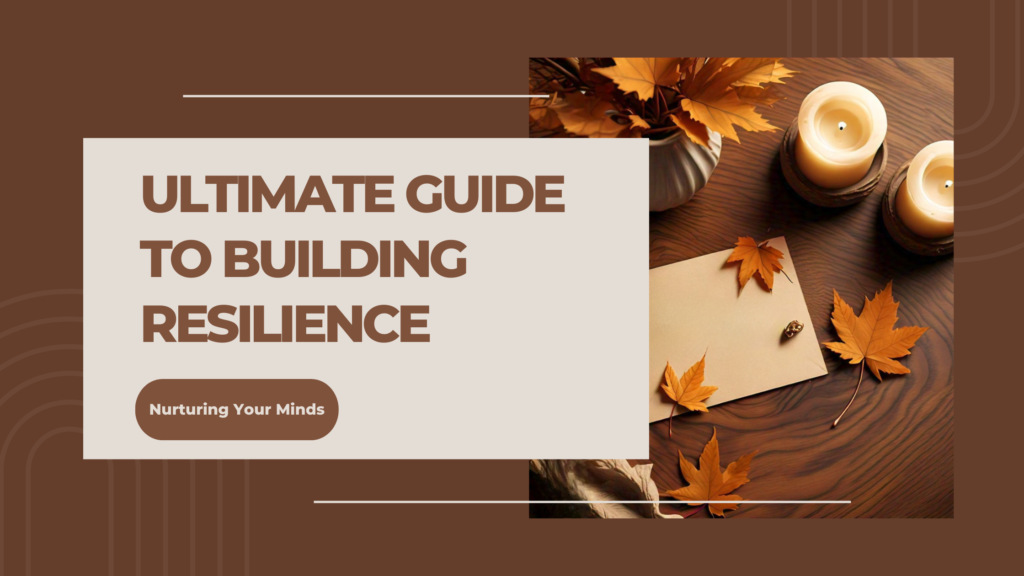Imagine waking up every day with a deep sense of confidence, knowing that you are enough just as you are and where your inner critic transforms into your biggest cheerleader. That’s the power of self-esteem, and it’s within your reach. Welcome to the journey of building self-esteem; where psychology meets self-love, and you become the hero of your own story.
Introduction: Understanding Self-Esteem
Self-esteem is the cornerstone of a healthy, happy life. It influences our thoughts, behaviors, and interactions with others. Yet, building and maintaining self-esteem can be a challenging journey, often filled with obstacles and self-doubt. Understanding the psychology behind self-esteem can empower us to cultivate a stronger, more resilient sense of self-worth.
Understanding Self-Esteem: The Psychological Perspective
Self-esteem is a complex construct that encompasses our beliefs about ourselves, including our sense of competence, worthiness, and the value we place on ourselves. From a psychological standpoint, self-esteem is influenced by various factors, including our upbringing, social interactions, and personal achievements.
- The Role of Childhood: Our early experiences with caregivers and significant others shape the foundation of our self-esteem. Positive reinforcement, unconditional love, and support contribute to a healthy self-esteem, while neglect, criticism, and emotional abuse can lead to self-doubt and low self-worth. We psychologists emphasize the importance of secure attachments and positive early experiences in fostering a strong sense of self.
- Social Comparisons: Humans are inherently social creatures, and our self-esteem is often influenced by how we perceive ourselves in relation to others. Social comparison theory, introduced by psychologist Leon Festinger, suggests that we evaluate our own abilities and worth by comparing ourselves to others. While this can sometimes motivate self-improvement, it can also lead to feelings of inadequacy and low self-esteem when we perceive ourselves as falling short.
- Cognitive Distortions: Our thought patterns significantly impact our self-esteem. Cognitive distortions, such as all-or-nothing thinking, overgeneralization, and catastrophizing, can distort our self-perception and reinforce negative self-beliefs. Cognitive-behavioral therapy (CBT) aims to address these distortions by helping individuals identify and challenge irrational thoughts, fostering a more balanced and positive self-view.
- The Impact of Achievements and Failures: Our accomplishments and setbacks also shape our self-esteem. Successes boost our confidence and reinforce our sense of competence, while failures can undermine our self-worth. Psychologists highlight the importance of resilience; the ability to bounce back from setbacks; as a crucial component of healthy self-esteem. Building resilience involves reframing failures as opportunities for growth and learning.
The Impact of Self-Esteem on Mental Health
Self-esteem profoundly influences mental health. High self-esteem is associated with resilience, optimism, and a proactive approach to challenges. People with healthy self-esteem tend to have better coping mechanisms, are less prone to anxiety and depression, and have more satisfying relationships.
On the other hand, low self-esteem can lead to a range of psychological issues. It can manifest as social withdrawal, self-criticism, and an excessive need for approval from others. Low self-esteem is also linked to mental health disorders such as depression, anxiety, and eating disorders.
The Cognitive Perspective on Self-Esteem
Cognitive psychology offers valuable insights into how we can build and sustain self-esteem. According to this perspective, self-esteem is largely influenced by our thought patterns and beliefs. Cognitive distortions, such as all-or-nothing thinking, overgeneralization, and catastrophizing, can undermine self-esteem.
Challenging Negative Self-Talk
One effective strategy for improving self-esteem is challenging negative self-talk. This involves recognizing and disputing irrational or unhelpful thoughts. For example, if you catch yourself thinking, “I always mess things up,” you can challenge this by reminding yourself of times when you succeeded.
Cognitive-behavioral therapy (CBT) is particularly effective in addressing negative thought patterns. CBT encourages individuals to identify and reframe cognitive distortions, replacing them with more balanced and realistic thoughts. This process can significantly enhance self-esteem over time.
The Role of Self-Compassion
Self-compassion, a concept championed by psychologist Kristin Neff, is another powerful tool for building self-esteem. Self-compassion involves treating oneself with the same kindness and understanding that one would offer a friend facing a difficult situation. It encompasses three main components:
- Self-Kindness: Being warm and understanding toward oneself during moments of failure or pain, rather than harshly self-critical.
- Common Humanity: Recognizing that suffering and personal inadequacy are part of the shared human experience, rather than feeling isolated by one’s imperfections.
- Mindfulness: Maintaining a balanced awareness of one’s emotions, avoiding extremes of suppression or exaggeration.
Research shows that self-compassion is linked to greater emotional resilience, reduced anxiety and depression, and higher overall well-being. By practicing self-compassion, individuals can foster a healthier, more enduring sense of self-esteem.
Building Self-Esteem Through Behavioral Strategies
In addition to cognitive and emotional approaches, behavioral strategies can also support self-esteem development. Engaging in activities that promote mastery, connection, and pleasure can enhance self-worth.
Setting and Achieving Goals
Setting realistic, achievable goals is a powerful way to build self-esteem. Accomplishing goals, no matter how small, fosters a sense of competence and self-efficacy. It’s important to celebrate these achievements and acknowledge the effort and progress made.
Positive Relationships
Nurturing positive relationships is crucial for self-esteem. Surrounding oneself with supportive, encouraging people can provide validation and reinforcement. Conversely, distancing from toxic relationships that undermine self-worth is essential.
Self-Care and Healthy Habits
Engaging in regular self-care and maintaining healthy habits can also strengthen self-esteem. This includes physical activities like exercise, which has been shown to improve mood and self-perception, as well as practices like meditation and mindfulness, which promote emotional balance and self-awareness.
The Influence of Culture on Self-Esteem
Cultural factors significantly impact self-esteem. Different cultures have varying values, norms, and expectations that shape how individuals view themselves. For instance, Western cultures often emphasize individualism and self-reliance, which can influence self-esteem differently than collectivist cultures that prioritize community and interdependence.
Understanding these cultural influences is important for developing a nuanced perspective on self-esteem. It highlights the need for culturally sensitive approaches in psychological interventions aimed at enhancing self-worth.
The Role of Social Media
In today’s digital age, social media plays a complex role in shaping self-esteem. On one hand, social media can provide a platform for positive social interactions, self-expression, and community building. On the other hand, it can also foster comparison, envy, and unrealistic standards of beauty and success.
Research indicates that excessive social media use, particularly passive consumption like scrolling through others’ posts, is associated with lower self-esteem. Active engagement, such as creating content and interacting with others, tends to have a more positive impact. Mindful use of social media, setting boundaries, and curating a supportive online environment can mitigate its negative effects on self-esteem.
These factors play a crucial role in shaping one’s self-esteem, either leading towards stress-free or stressful life. But if you’re experiencing stress because of low self-esteem, HERE is my detailed and therapeutic De-Stress Nurturing Program, in order to cope with and manage your stress in a more efficient manner.
The Role of Self-Esteem in Mental Health
Healthy self-esteem is not just a feel-good concept; it’s a critical component of mental health. High self-esteem is associated with a range of positive outcomes, including better stress management, higher life satisfaction, and lower rates of depression and anxiety. Conversely, low self-esteem is linked to a variety of mental health issues, including depression, anxiety, eating disorders, and substance abuse.
- Depression: Low self-esteem is both a symptom and a risk factor for depression. Negative self-perception and feelings of worthlessness are common in individuals with depression. Building self-esteem through therapeutic interventions can play a crucial role in the treatment and prevention of depressive disorders.
- Anxiety: Individuals with low self-esteem are more susceptible to anxiety, particularly social anxiety. Fear of judgment and rejection can intensify feelings of inadequacy and lead to avoidance behaviors. Enhancing self-esteem can reduce anxiety symptoms by promoting a more confident and self-assured outlook.
- Eating Disorders: Low self-esteem is a significant factor in the development and maintenance of eating disorders. Negative body image and feelings of inadequacy drive disordered eating behaviors. Addressing self-esteem issues is a key component of treatment for eating disorders, promoting a healthier relationship with food and body image.
- Substance Abuse: Individuals with low self-esteem may turn to substances as a way to cope with feelings of inadequacy and self-doubt. Substance abuse can provide temporary relief but ultimately amplify self-esteem issues. Building self-esteem through therapy and support groups can aid in recovery and reduce the risk of relapse.
Practical Strategies for Building Self-Esteem
Building self-esteem is a gradual process that requires consistent effort and practice. Here are some practical tips to help enhance your self-worth:
- Practice Self-Awareness: Reflect on your strengths, achievements, and qualities. Keep a journal to track positive experiences and accomplishments.
- Challenge Negative Thoughts: Identify and reframe negative self-talk. Replace self-criticism with constructive and compassionate statements.
- Set Realistic Goals: Break down larger goals into smaller, manageable tasks. Celebrate your progress and achievements along the way. Here is you can find out how to master doing this.
- Cultivate Self-Compassion: Treat yourself with kindness and understanding, especially during challenging times. Practice mindfulness to stay balanced and present.
- Build Supportive Relationships: Surround yourself with people who uplift and encourage you. Seek out positive social interactions and avoid toxic relationships.
- Engage in Self-Care: Prioritize activities that promote physical, emotional, and mental well-being. Exercise regularly, eat healthily, and practice relaxation techniques.
- Limit Social Media Use: Be mindful of your social media habits. Focus on active engagement and set boundaries to prevent negative comparisons.
Self help Workbooks can also be used in order to thrive for higher self-esteem in a more organized and effective manner.
The Journey to Self-Esteem: A Personal Story
To illustrate the transformative power of building self-esteem, let’s explore the journey of Sarah, a young woman who struggled with low self-worth for years. Sarah’s childhood was marked by criticism and neglect, leading to a pervasive sense of inadequacy. She constantly compared herself to others and felt she could never measure up.
In her early twenties, Sarah’s low self-esteem manifested as social anxiety and depression. She avoided social situations, fearing judgment and rejection. Her inner critic was relentless, telling her she was not good enough. Sarah’s turning point came when she sought the help of a therapist who specialized in CBT.
Through therapy, Sarah began to challenge her negative self-talk and replace it with more realistic and positive thoughts. She practiced self-compassion, learning to treat herself with kindness and understanding. Sarah set small, achievable goals and celebrated her successes, gradually building her confidence.
Mindfulness practices helped Sarah become more aware of her thoughts and emotions, reducing the impact of her inner critic. She also sought out supportive relationships, surrounding herself with people who valued and encouraged her. Over time, Sarah’s self-esteem improved, and she experienced significant reductions in anxiety and depression.
Sarah’s journey is a testament to the power of building self-esteem. It’s a continuous process that requires commitment, self-awareness, and a willingness to change. But the rewards; resilience, confidence, and a healthier, happier life; are well worth the effort.

Conclusion
Building self-esteem is a multifaceted journey that involves cognitive, emotional, and behavioral strategies. By understanding the psychological foundations of self-esteem and implementing practical techniques, individuals can cultivate a healthier, more resilient sense of self-worth. Remember, self-esteem is not about perfection; it’s about embracing and valuing yourself as you are.
With dedication and self-compassion, you can wake up each day with a deep sense of confidence, knowing that you are enough.



